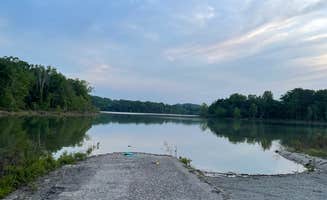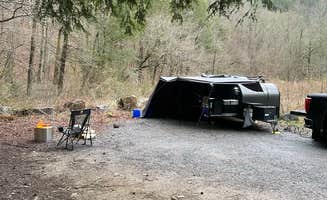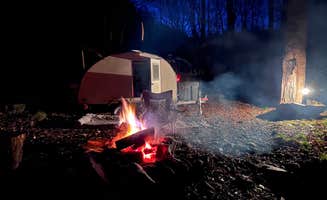Dispersed camping near Morristown, Tennessee provides primitive outdoor experiences in Cherokee National Forest and nearby Pisgah National Forest. The region sits at elevations ranging from 1,200 to 4,500 feet with a temperate climate that includes four distinct seasons. Summer temperatures average 75-85°F while winter temperatures often drop below freezing, creating variable camping conditions throughout the year.
What to do
Fishing opportunities: The creeks and streams throughout FS 289 Pull Off provide accessible fishing spots. "The creek is only a few feet away from the campsite," notes camper John B., making it convenient for anglers to cast a line directly from their campsite.
Hiking access: Several dispersed sites serve as unofficial trailheads for local hiking routes. Many unmarked paths follow creek beds and ridge lines through the national forests. Seasonal considerations affect trail conditions, with spring bringing muddy terrain while fall offers more stable footing.
Wildlife observation: Dawn and dusk provide optimal wildlife viewing hours when deer, turkey, and various bird species are most active. Spring and early summer offer the best birdwatching opportunities when migratory species return to the area. Keep food secured as black bears inhabit the surrounding forests.
What campers like
Water proximity: Many dispersed sites feature creek or stream access. At Paint Creek Corridor, campers appreciate the sound of running water nearby. "I did enjoy my stay here," reports Andrew S., though he notes limited site availability despite forest service information suggesting multiple camping locations.
Solitude: The remote nature of these sites provides genuine seclusion. "It is very peaceful with a nice stream running by," explains Jim M. about FS 289 Pull Off. Weekday camping significantly increases chances of finding available sites, particularly during off-peak seasons (late fall through early spring).
Cost efficiency: All dispersed sites in the area operate on a first-come, first-served basis with no reservation systems. Weaver Bend Road offers free camping opportunities but requires self-sufficiency as no amenities exist on site.
What you should know
Vehicle considerations: Access requirements vary substantially between sites. While some campers report needing high-clearance vehicles, others have successfully navigated to sites in standard passenger cars. "In dry conditions, I got here just fine in an Outback Wilderness, and 5 minutes later a Prius drove up," reports John B. about FS 289 Pull Off, contradicting assumptions about necessary vehicle capabilities.
Capacity limitations: Available camping spots can be extremely limited. Weekends from late spring through early fall often see sites filled by Friday afternoon. Arriving midweek substantially improves chances of securing a site.
Seasonal closures: Some forest roads accessing Sam's Gap Overlook close during winter months or after heavy precipitation events. Always check current Forest Service notices before departing, especially during winter months when road conditions can deteriorate quickly.
Tips for camping with families
Safety planning: Cell service remains inconsistent throughout rustic camping areas near Morristown. Create detailed trip plans including expected return times and share with non-traveling family members before departure. Establish meeting points in case family members become separated.
Insect management: Mosquitoes and ticks present challenges from late spring through early fall. "Definitely bring bug repellent," advises John B. after camping at FS 289 Pull Off. Consider permethrin-treated clothing for children to reduce tick exposure.
Water purification: No potable water exists at dispersed sites, requiring families to either bring sufficient water supplies or purify from natural sources. When camping at isolated sites like Weaver Bend Road, pack at least one gallon per person per day plus additional water for cooking and cleaning.
Tips from RVers
Size restrictions: Most dispersed camping areas near Morristown accommodate small to medium trailers or vans only. Jim M. recommends that at FS 289 Pull Off, "a high clearance overland teardrop should make it back here ok but not recommended for regular RVs."
Leveling challenges: Natural terrain at dispersed sites rarely provides level parking. Bring multiple leveling blocks and wheel chocks, particularly when camping on the uneven terrain common throughout Cherokee National Forest.
Waste management: No dump stations exist at dispersed sites, requiring self-contained waste management. The closest dump stations require drives of 25+ miles to developed campgrounds or travel centers on major highways.




